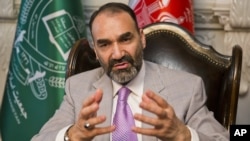U.S.-led diplomatic efforts appear to have persuaded ousted Afghanistan provincial governor Atta Mohammad Noor to postpone this week's planned anti-government demonstration.
Noor governed the northern Afghan province of Balkh for 13 years until he was removed from office in December by President Ashraf Ghani. But he refused to quit and dismissed the presidential order as illegal.
In his bid to press the central government to meet his demands, Noor planned to lead a massive rally of thousands of vehicles packed with supporters for a three-day sit-in protest in Kabul starting Tuesday. But the ousted governor told reporters Sunday in the provincial capital, Mazar-i-Sharif, that he is postponing the protest.
"We have been asked by the influential figures, civil activists, our international partners and people from different walks of society to postpone our upcoming rally in Kabul," said the ousted governor. He did not elaborate but pledged to announce a new date for the protest very soon.
The planned anti-government rally was to coincide with an international conference in Kabul Wednesday where President Ghani will present his government's comprehensive plan for promoting peace with the Taliban-led armed opposition. Noor said the protest has been postponed to ensure it does not hamper the "Kabul Process" meeting which is being held to help Afghanistan.
His remarks came a day after visiting U.S. permanent representative to NATO, Kay Bailey Hutchison, stressed the importance of peacefully resolving political differences. She told reporters in Kabul on Saturday that during her four-day visit to Afghanistan she and several colleagues from NATO traveled to Balkh province.
"What we are doing is saying to our Afghan leaders, settle this, let's go forward. We are not taking a role in it but we are certainly saying this is part of reconciliation and moving forward," Hutchison told reporters.
General John Nicholson, who commands U.S. and NATO troops in Afghanistan, also spoke at Saturday's news conference and strongly urged Afghan political leaders not to allow political differences to hamper security efforts.
"We respect your political process and your political evolution, we respect your politicians. As a military commander, my only request would be that politics not undermine security and we keep in mind our primary goal of helping this country get to a peaceful reconciliation," Nicholson noted.
The political dispute threatens to undermine Afghan parliamentary elections later this year.
Noor in his speech Sunday again accused Ghani's administration of not resolving any of the issues facing the country, including Taliban and ISIS insurgencies, rising ethnic tensions, and economic challenges facing poverty-stricken Afghans.
"The wave of resistance in the wake of my dismissal is not about Balkh. It's about resisting the rule of a small clique and to find solutions for challenges facing our people," asserted the fired governor.
Noor reiterated that his Jamiat-e-Islami party, which shares power in Ghani's central government, has made a set of demands and will not back down from it. The powerful non-Pashtun politician wants among other things powers to appoint his successor and the provincial police chief.
Last week the governor of Samangan province, which borders Balkh, also refused to accept removal orders from the president but reversed his decision days later after Ghani reportedly promised him another governmental position.
Under President Donald Trump's Afghan war strategy, U.S.-led troops are increasing battlefield pressure on the Taliban-led insurgency to contain its influence and force it to come to the negotiating table for peace talks with the Kabul government.
The U.S. strategy has witnessed increasing intensity in airstrikes against the insurgents and the Taliban has also retaliated with increased attacks, including suicide bombings.
The insurgent group, which controls or contests about 44 percent of Afghanistan's territory, has refused to engage in any peace talks with the government and insists on holding such a dialogue with the U.S. only. The Taliban maintains that only Washington, and not what it calls the "puppet" Afghan leadership, can determine the fate of the war in Afghanistan.
U.S. officials, however, have called on the Taliban to directly engage in a peace and reconciliation process with what they say is the legitimate Afghan government.
ISLAMABAD —




